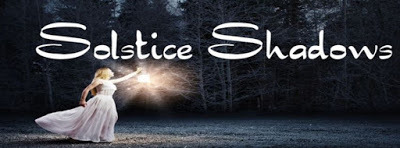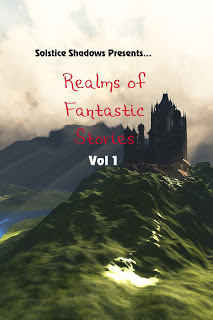K.C. Sprayberry's Blog, page 144
October 2, 2016
Everybody Reads YA ~ The Ghost Catcher

Happy “Everybody Reads YA” Sunday! Today I’m sharing an excerpt from my paranormal short story: The Ghost Catcher. The Ghosties reunite.

No adult in Landry, Georgia would ever admit a teen can do something right. Not a one, for then they would have to 'fess up to the teens being able to make their own decisions. The people in charge just plain ignored any good thing teens did.
Then I saw a problem, one I couldn't say a word about. All I could do is stand to one side and watch as disaster loomed.
I was the last person with Maren Dougless and Zac Morton Friday afternoon at the high school. What I saw of their auras – green with a black outer edge – scared me right down to my toes. As if that wasn't bad enough, since black represented death, and green meant vibrant life, in addition the center of those auras each had a reddish eye in the center with sickly yellow streaks arcing throughout it.
About the Author
Born and raised in Southern California’s Los Angeles basin, K.C. Sprayberry spent years traveling the United States and Europe while in the Air Force before settling in northwest Georgia. A new empty nester with her husband of more than twenty years, she spends her days figuring out new ways to torment her characters and coming up with innovative tales from the South and beyond.
She’s a multi-genre author who comes up with ideas from the strangest sources. Some of her short stories have appeared in anthologies, others in magazines.

A gift to know when people are in trouble of the ghostly type puts Hailey Hatmaker in the middle of a major problem – one that winds up getting her into more hot water than she can handle. In true Hailey Hatmaker fashion, she dives into what turns out to be a battle with Limbo, her number one nemesis.
Can Hailey rescue two friends before it's too late? Or is she forever condemned to losing to Limbo?
The Ghost Catcher
Published on October 02, 2016 00:00
September 28, 2016
The Cover Letter
When I started writing and submitting, the cover letter was one of the first things I learned how to write. It was impressed on me that unless I had a cover letter that popped, one that grabbed a publisher by the throat the second they read it, I could pretty much forget about having a contract offered.
Here I am, many years later, and the art of writing a cover letter, if one writes one at all, seems to have disappeared in the dust of the electronic age. Yet, with electronic submissions, with almost immediate responses when we hand a publisher our life’s work, shouldn’t the cover letter be the most important thing you spell check, reread to see if it will grab someone’s attention, and ensure that we’ve made a good first impression?
Absolutely. All of those things. The cover letter is still the first instrument a publisher uses to gauge if you are the right person to make part of their growing stable of writers.
Yet, in this electronic age, where many people have eschewed the desktop or laptop computer for their phone, the cover letter has become somewhat dated to those with the latest electronic technology.
What do I mean?
Below are examples of cover letters received. Names, places, etc have been removed so as not to cause undue embarrassment.
Yo, dude or dudette, here’s a book I wrote. Can U chk it out and give me a great contract? This bok will be the best 1 U ever got. Signed: The Most Fabulous Author In The World.
Uh… No. No, I will not send you a contract. No, I will not even open your submission to see if you actually wrote a real book instead of one full of abbreviations, a lack of knowledge about capitalization, and desperately in need of a spell check. I’m too busy to do anything more than send you the generic “Thank you for submitting but your book is not for us” response—a response I swore I would never use once I became an editor-in-chief, but have now discovered why it’s used.
Even better are these types of cover letters. They come in several times a month. One was even to announce a novel by the same title.
Dear Mr. or Ms. Editor-In-Chief,
My name is blah, blah, blah. I am currently working for major company as a whatever profession. I love to (add a long list of activities not related to writing) but in my spare time, I have been penning THE GREAT AMERICAN NOVEL for the last few days, years, months.
Of course, this cover letter goes on for the hard sell, about how the publisher will make millions off this novel, which apparently doesn’t need editing or proofreading. Why, the author will even provide their own cover art, designed and done by them, because no one else can grasp their concept. Of course, they added this cover art to the attached manuscript, so the clueless editor-in-chief can see what it looks like. In fact, all the editor-in-chief has to do is send along a contract and then the author will instruct us on what they want done next.
This particular cover letter does have my attention, in a staring at a disastrous incident and being unable to look away. I will open the submission, and then groan and reach for the coffee cup to refill it, knowing that I will need a triple shot of the cappuccino I save for special occasions to add to the regular coffee to stay awake.
Here is another individual who needs to learn the basic rules of grammar, along with a few other things. They have no clue about formatting. After viewing cover art that will not pass the review to get a print edition done, I’m usually staring at a really weird, nearly unreadable font that’s sized around seventy-two. Once I manage to find the actual book, after having to go through a very long table of contents, a dedication to everyone the author claims helped start them on their trek to instant fame—all the way back to kindergarten—I am very happy to have taken that triple cappuccino shot, or I’d be nodding off. The opening usually starts the book long before it should have, but that’s a subject for another day.
Back to the cover letter. It’s very simple to write a perfect cover letter.
First, you need to put your basic information on the electronic form you’re filling out—name, snail mail address, phone number if you are so inclined, and your email address. Please be aware, most publishers, especially small ones, won’t actually call you. Their staff is generally small and has a lot to accomplish during their work day.
A salutation is always good. Do your research here. Go over the publisher’s website. See who handles submissions. If you can’t tell, the editor-in-chief is the place to start. If they don’t handle submissions, they will forward your email to the proper person.
The first paragraph is where you introduce yourself. Please, be brief. We don’t need to know anything other than your name, the title of your book, and a five to ten word tagline. Taglines are another subject for another day.
The second paragraph is a short, to define short so there are no misunderstandings, two to three sentence synopsis of your book. This was probably the hardest thing for me to learn, how to take the synopsis I’d labored over and change it to one that would fit on a cover letter, which should only be one page long.
The third and final paragraph is where you thank the publisher for looking over your submission and indicate you will await their response, at their convenience. Then you sign off with a signature, or in the case of an electronic submission, just your name.
That’s all a cover entails. Use a plain font, such as Times New Roman or Arial. Don’t do bold or underlining. Italics is all right for your book’s title. Nothing else.
Why such an uncreative, boring letter. Because like a job you’re applying for at a business, the cover letter to a publisher is your application to become part of their company. You need to impress on the person reading it that you are a professional.
Published on September 28, 2016 00:00
September 27, 2016
Addictions
No one wants to be considered an addict. Anyone who has been caught up in that nightmare can tell others the difficult time they had “kicking the habit,” as the situation has been called. If asked, those who have stopped smoking, stopped using drugs, or controlled their overeating will go into great detail about the side effects—shakes, a desire to get their hands on whatever they’re trying to stop using or overusing, short tempers, even pushing away everyone around them who can actually help. If pushed hard enough, they will admit that they never should have started the habit. Now that they’re getting clean, they’re actually turning into someone else, a person you really don’t like much. Perhaps it’s their attitude, where they believe anyone who doesn’t “kick their habit” is a weakling and should be lectured from sunup to sundown and long into the night. Perhaps it’s because the friendship you shared was predicated on the thing to which they were addicted.
Or maybe by watching this person shed a bad habit, you’re seeing your own faults.
Just One More is a short story about a teen who relieves her stress by smoking. Even though she attends a school that is smoke free, she feels she needs to find ways to ease the stress in her life by having a cigarette when and where she pleases. She doesn’t think about consequences, until she finds herself in the unenviable of being suspended during finals.

Blurb
One more cigarette. Lydia continually fools herself, by imagining that she’ll relieve the stress in her life by smoking one more cigarette. Her habit results in being caught during finals at school, and being expelled. She learns who did this to her and vows revenge.
There is only one little issue left. Can she throw out the cigarettes or will she be caught in the same downward spiral as her brother?
Get Just One More on Amazon!
Excerpt
Lydia draws hard on the cigarette, blowing toward the open window. She feels the stress of not studying for Government wash out of her, relaxing with each drag on the cigarette. Waving away the smoke wafting around her, she peers around the stall door.
Was that the bathroom door opening?
Taking two more quick drags, she drops the butt into the toilet and winces at the hissing sound. Flushing, she searches for breath freshener and perfume in her purse, liberally using both. Cautiously, she opens the door and glances around. Certain no one has seen her sneak the cigarette, she walks to the sink and checks her hair, sniffing furtively.
Nothing noticeable. Good. Time for my final.
Published on September 27, 2016 00:00
September 26, 2016
Defining Your Book
The hardest part of being an author isn’t writing a book.
Now that I have your attention, let me repeat. The hardest part of being an author isn’t writing the book.
Yes, you labor over that book day in and day out for what seems like a lifetime. Your characters are so real to you that you may have conversations with them. Each scene is carefully plotted in order to find the right blend of action and description. You’ve spent days upon days developing your characters. And right about now, you’re wondering if I've been smoking those weird cigarettes or took a dive off a cliff right as the waves pulled out.
Let me assure you that I haven’t used any mind altering drugs and cliff diving is not on my bucket list. One other thing—I’m very serious in this statement.
You are about to embark on an adventure that will have you pulling out your hair and wondering if writing another book will be easier.
Just what is that adventure? Why, you’re about to start submitting to publishers. But there is one thing you need to do first—classify what kind of book you’ve written.
“Oh,” you say. “Is that all?”
Yeah, that’s all you need to do. Your new discoveries are about book classification, better known as how you’ll define your book. This adventure is about to put you on a high speed chase on a narrow two lane road, skydiving without a parachute, and sitting still while your two-year-old climbs onto a hot stove. Once you start attempting this feat of daring-do, you’ll decide those other hair raising activities are pretty tame.
“Oh,” you repeat. “Is that all?”
Most people think it’s fairly easy to define their book. After all, you’ve just spend a huge amount of time writing a book you carefully outlined at the beginning. You decided long before you wrote the book what category would define it. Your initial response will be to use thriller, young adult, romance, western, or any of the main categories to define your book.
Stop right there. You are about to make a mistake that will create difficulties to have your book rank high on Amazon and other sales venues. Sure, your book has a certain category you can safely slip it into, but how many thousands or millions of other books are also in that category? Take a peek and realize you are now in the “what will I do to get people to notice my book?” group that is desperately searching through the innumerable Amazon sub-categories to decide which one best fits your book.
I did warn you. A category search can take as long as it took you to write your book. It can consume hours you should be spending on creating promotional material. You are about to give up your sanity as you decide on the best sub-categories that will work for your book and give you the exposure you need.
I’m right there with you. Time for me to start hunting categories for my next book…
Published on September 26, 2016 00:00
September 25, 2016
Everybody Reads YA ~ Secret From The Flames

Happy “Everybody Reads YA” Sunday! Today I’m sharing an excerpt from my paranormal short story: Secret From The Flames. Relatives can cause so many problems.

The sense of time gathers speed. For so long, she dwelled in limbo, awaiting the moment when she would reunite with him. He brings conflicting emotions. Tressa loved him, yet he killed her. Logicdictates that she must hate him.
Her death came about not because he loved her, but because he had to hide his acts, what he had done to ruin his family name.
Duke Turkin was incapable of caring about anyone but himself. The only things he really loved were power and money.
About the Author
Born and raised in Southern California’s Los Angeles basin, K.C. Sprayberry spent years traveling the United States and Europe while in the Air Force before settling in northwest Georgia. A new empty nester with her husband of more than twenty years, she spends her days figuring out new ways to torment her characters and coming up with innovative tales from the South and beyond.
She’s a multi-genre author who comes up with ideas from the strangest sources. Some of her short stories have appeared in anthologies, others in magazines.

Everyone pays for the mistakes of their family, but for Ciara Tressa Lafferty, that particular mistake happened almost sixty years ago, and nobody will forget it. She's constantly compared to her great aunt, and even worse, she looks like the woman.
A senior in high school with a great future ahead of her, Ciara has no clue what this Halloween holds for her. That it's the anniversary her great aunt’s disappearance is just one more annoyance as she discovers her boyfriend's great grandfather refuses to let her move on with her own life. Then Ciara finds herself thrust in a nebulous existence within her own body when Tressa Anne Lafferty, her great aunt, possesses her. Ciara tries to break free, but Tressa refuses to release her until Ciara discovers the secret hidden within the charred remains of McLaren House--a revelation which will rock the whole town.
Secret From The Flames
Published on September 25, 2016 00:00
September 21, 2016
All Caps
As one who spends a great deal of time working with authors through email, I have to say that addressing any individual with all capital letters in a letter is wrong. You might feel strongly about what you have to say, but shouting isn’t going to achieve anything except being put on the back burner until the person you’re addressing has time to respond to you civilly.
But, you protest, you weren’t really shouting. It was just a message you felt was important. That’s why you used all caps.
This is an internet world and there are rules. One of the most important to remember is this—all capital letters means you are shouting at a person. They’re probably envisioning you thrusting a finger in their face, screaming and red faced yourself, as you’re trying to get your point across. And the person you sent that email to is more than likely getting pretty steamed themselves.
Make this person one who is representing your publisher and you may have just committed a fatal faux pas. Even the author with their company who sells more books than anyone else knows better than to scream at an editor if they’re upset. In fact, there is a rule to cover this situation, a rule you were probably told as a child and have more than likely forgotten.
Never talk to someone or send them a letter while you’re mad. Wait until you calm down to talk to them. You’ll be able to resolve the situation much better.
That is advice you should use now. Don’t fall into the trap of believing your opinion, and only your opinion, counts. Don’t be that author the one your publisher can’t wait to get rid of as soon as your current contract ends.
Instead of screaming and shouting for attention, speak, or write, in a normal tone of voice. You’ll get what you’re after much faster.
Published on September 21, 2016 00:00
September 20, 2016
Irritating Siblings
Most of us have one of these individuals in our family. That one sibling you just want to strangle. It could be a brother who takes every opportunity to embarrass you just when you don’t expect it. You could be saddled with a sister who puts a whole new definition on drama queen. Whatever you’re saddled with, you definitely want this person to go away forever—or do you?

Blurb
Lainie’s older stepbrother, Mark, is the bane of her existence. He always embarrasses her. She swears she hates him… until a terrible day when she realizes just the opposite is true.
Get Go Away on Amazon!
Excerpt
Glancing in all directions, I sneak toward where I live. He can’t see me. I can’t let him know that I’m home. Not until I’m safely inside.
“Hey, Lainie! Do your friends know that you dance in front of the bathroom mirror every night? Maybe I should sell tickets.”
Face burning, I duck my head, running up the stairs and the last few feet to our apartment. How can my jerk of a brother do this? Turning, I stand in front of the door and scream out my frustration.
“Mark, I don’t want you to live here anymore. You should stay at your dad’s this year. Like in never come back!”
Published on September 20, 2016 00:00
September 19, 2016
Social Media – The Back Fence
Years ago, it was considered cool to get your news from the “back fence,” where neighbors would meet to talk about what was going on in the area. In the twenty-first century, far too many people are busier than they were back then with work, dealing with their children’s activities, and involved with their own lives to stop and enjoy those back fence moments. Yet, we’ve managed to do that in another way.
Our current back fence is social media. We “meet” people we only know through their profile information and discuss local and world events. We share information—sometimes it’s true, other times you should have done your research. The information accessed on this virtual back fence has a major drawback for the author—your career in writing can be destroyed if you say the wrong thing on your back fence.
What is the wrong thing to say?
First, I want to point out that I firmly believe in freedom of speech. We all should be able to say what we want about a situation at any given time. We should be able to express our opinions without backlash.
However…
Reality is much different from what should be. As authors, our reality is that we have to consider the feelings of our fans. We live in a world that is currently focusing on their feelings—not the feelings of others, but only their own feelings about any given situation. What you say regarding religion, politics, or the current news can and will affect your sales.
I can hear a lot of you crying out that I’m wrong. Am I? Are you willing to risk losing fans and sales to speak your mind about any of the current “hot” situations? Do you need to see your sales dwindle to nearly nothing in order to understand that we now live in a time where the feelings of others doesn’t count, only a single person’s mindset is what is important?
It’s hard seeing these posts on Facebook or tweets on Twitter you agree with and being unable to share them with your opinion attached. Try objecting to what someone else has posted and you’re about to discover just how hateful people can be when their views are challenged. Unless and until the world discovers that freedom of speech is a right enjoyed by all, and that you have the right to express your opinion, even if it is the unpopular one, authors must take the high road and remain mute about hot topics in order to develop a lasting fan base.
Published on September 19, 2016 00:00
September 18, 2016
Everybody Loves YA ~ Mama's Advice

Happy “Everybody Reads YA” Sunday! Today I’m sharing an excerpt from my paranormal short story: Mama’s Advice. Lorelei leans heavily on her deceased mama.

“Never let a boy take advantage of you, baby girl. That’s one of the most important things I wanted to tell you afore this disease took me, but I never had a chance.”
A tall, slender seventeen-year-old girl stands under the shady branches of a majestic oak tree. Lorelei Perrijames crouches down in front of a tombstone. With a finger, she traces the name on the cold, unyielding granite: Bethany Elizabeth Perrijames.
“I still miss you so much, Mama, even though you’ve been gone a year.” Lorelei sniffles. “I miss your hugs. Your silly pranks, like the day you told me my dress was caught in my underwear.” Even if I totally freaked, but that was part of the fun. “Mostly, I miss all the things you taught me.”
About the Author
Born and raised in Southern California’s Los Angeles basin, K.C. Sprayberry spent years traveling the United States and Europe while in the Air Force before settling in northwest Georgia. A new empty nester with her husband of more than twenty years, she spends her days figuring out new ways to torment her characters and coming up with innovative tales from the South and beyond.
She’s a multi-genre author who comes up with ideas from the strangest sources. Some of her short stories have appeared in anthologies, others in magazines.

Lorelei loses what's left of her family close to graduation, but she still has Mama to lean on, or rather she has Mama's ghost. At first, Lorelei ignores the opinion about her boyfriend, Chase, but then she figures out he is acting strangely and has a new tattoo covering a scar he never had before.
Chase, however, isn't one to give up on a girl. He dumps them not the other way around, until Mama's ghost gives Lorelei the strength shut him out of her life.
Mama's Advice
Published on September 18, 2016 00:00
September 16, 2016
Book Release: Realms of Fantastic Stories Vol 1

From castles to forests, humans to animals, bards to the rainbow bridge—journey into magical lands, imaginations, and adventure with seven talented Solstice Publishing authors.

Cats prepare for one of their kind to cross the rainbow bridge. A minstrel assists in protecting the kingdom he serves. A queen is in hiding… and other stories that will fire the imagination of all who enter this realm.
Realms of Fantastic Stories Vol 1 features K.C. Sprayberry, Stephen St. Clair, Rocky Rochford, Rick Ellrod, KateMarie Collins, Debbie De Louise, and Margaret Egrot with tales sure to delight and please.
Get Realms of Fantastic Stories Vol 1 on Amazon!
Published on September 16, 2016 02:08



